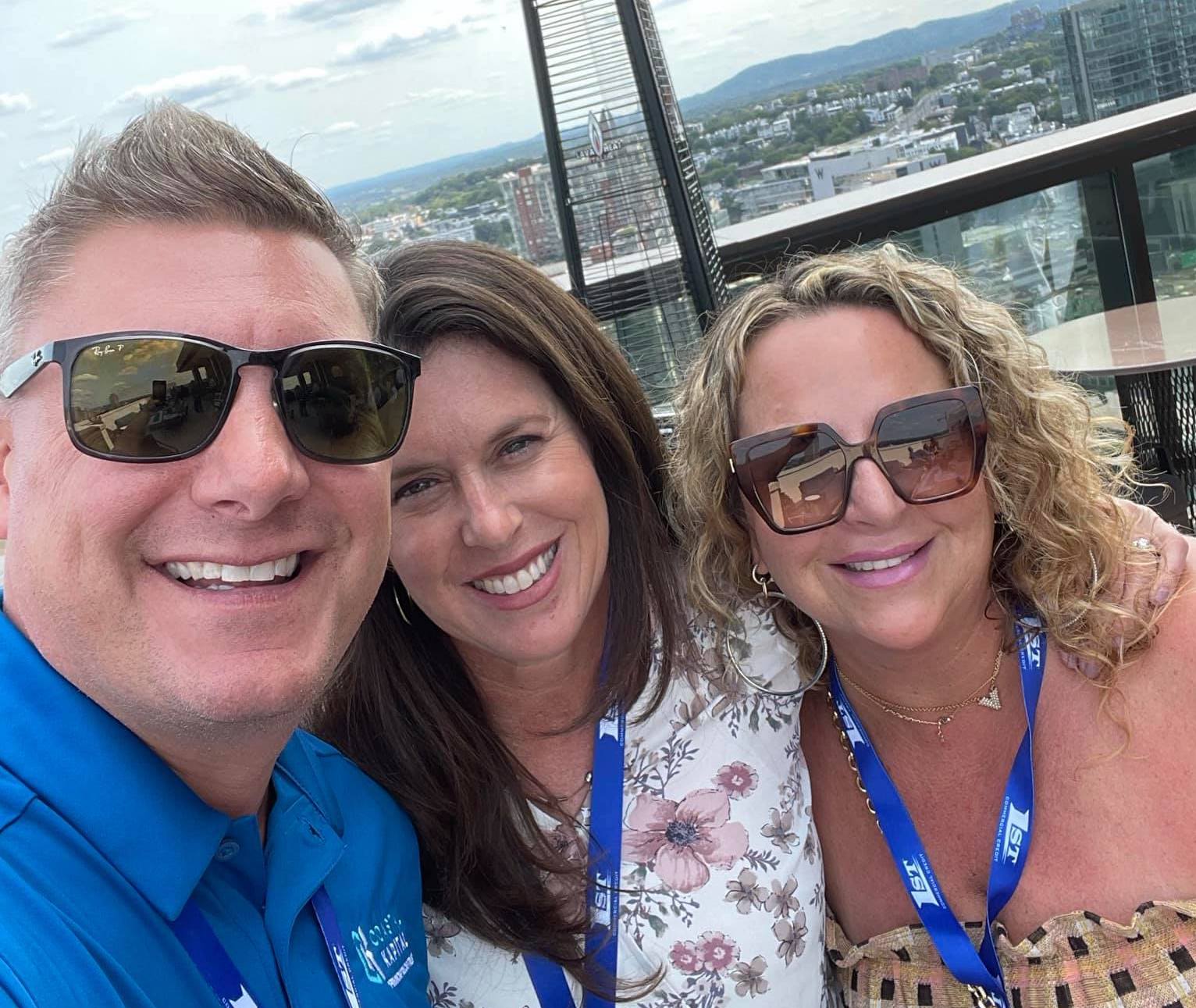Business
How To Build An Empire With Your Favorite People

Imagine starting a new company with your best friend. For many, the idea of working closely with someone they know sounds appealing—the perfect recipe for entrepreneurial success. For others, it sounds like a recipe for disaster.
Despite the differing opinions, history has provided examples of high-profile partnerships that have worked tremendously. Think Ben and Jerry’s or Hewlett-Packard.
Friends understand the vision and endure setbacks
Given that friends already understand each other’s subtle signals, there is less chance of being offended, or surprised, by someone’s communication style. Friends can detect and read intentions with greater ease. Moreover, companions tend to have ‘history’—whether from working in the same industry, sharing life experiences or educational paths—which gives them a particular outlook, and, therefore, the ability to agree on the direction of the business.
Emerging research suggests businesses founded by friends in the startup sector are more likely to prevail under financial pressure. When companies go through financial loss, or lack of funding, existing partnerships within management help to solidify the team. Conversely, teams composed of ‘strangers’ were found to be less likely to endure financial storms.
Kortney Murray, CEO and Founder of Coastal Kapital LLC—a commercial equipment and asset-based lending company—has become a leader in the financial services industry by building her core team with friends and associates.
“My company is molded around the people that I care for most,” says Murray. “Although I’ve never had children, my management team has become a part of my ‘family’. We co-create vision, we have fun, and we share in the fruit of our success. As we grow, I add to the team those who feel like the ‘right fit’.”
Is this person the ‘right fit’ for your company?
Working with friends does have its unknowns. How will people act or perform in any given scenario? To avoid this, some specialists advise ‘dating’ a prospective employee, running through a number of business scenarios in an attempt to gauge strengths and weaknesses. Whilst Murray describes her approach to people as ‘empathic’—understanding needs and reading emotions—she has also invested in a highly sophisticated screening tool that measures one’s ‘culture index’.
Murray explains: “The index provides a deep insight into natural ability, creativity and best-fit within the organization. It highlights stress points and helps me to anticipate when someone might feel stretched. The mathematical index is based on sound science and removes much of the guesswork, so I don’t have to try and be ‘psychic’. I can focus my energy on growing the company, whilst getting the best from each employee.”
Never assume you know what others are thinking

Assuming you know what someone is thinking, planning or feeling is one of the most common mistakes when it comes to teaming up with friends. Murray, for example, would once have described her best friend from college as being “the same person”.
“We are so vibrant, excited, and constantly laughing,” Murray continues, ”but, in fact, she absolutely can’t stand sales or being on the phone. She’s timid in her approach…If I had not asked those probing questions at the outset, I would have hired her for sales!”
Preserve friendships and prioritize marriage
Balance, like most areas of life, can be difficult to achieve. As the ‘boss’, how can you have the tough conversations with people you know, without jeopardizing relationships. To keep potential friction to a minimum, Murray advocates “being sensitive to employee needs”. She explains: “I don’t like to micromanage. They respect my business, I respect their time. It’s a mutual agreement. If you have to finish up early because you have family matters to attend to, it’s fine as long as we maintain that level of trust and respect.”
For any would-be entrepreneur, the toughest challenge must be working with family members. Business spats can quickly spill-over into home life and place added strain on relationships. Murray is quick to point out the reality of growing a business alongside her husband: “We’ve had 12 years of marriage; 10 of those in business together. He probably takes on more than he should; I should allow him a little bit more space. Although we work well together, I want to find time to date my husband again. In some ways, our business has taken away from our personal life.”
Murray continues: “Entrepreneurs are often guilty of forgetting about themselves. You ask everybody about themselves, but sometimes people don’t ask you about you. You have to be the strong one. I’m really trying to make time for myself. If I’m thriving, it’s going to have a positive impact on others.”
Business
High Volume, High Value: The Business Logic Behind Black Banx’s Growth

In fintech, success no longer hinges on legacy prestige or brick-and-mortar branches—it’s about speed, scale, and precision. Black Banx, under the leadership of founder and CEO Michael Gastauer, has exemplified this model, turning its high-volume approach into high-value results.
The company’s Q1 2025 performance tells the story: $1.6 billion in pre-tax profit, $4.3 billion in revenue, and 9 million new customers added, bringing its total customer base to 78 million across 180+ countries.
But behind the numbers lies a carefully calibrated business model built for exponential growth. Here’s how Black Banx’s strategy of scale is redefining what profitable banking looks like in the digital age.
Scaling at Speed: Why Volume Matters
Unlike traditional banks, which often focus on deepening relationships with a limited set of customers, Black Banx thrives on breadth and transactional frequency. Its digital infrastructure supports onboarding millions of users instantly, with zero physical presence required. Customers can open accounts within minutes and transact across 28 fiat currencies and 2 cryptocurrencies (Bitcoin and Ethereum) from anywhere in the world.
Each customer interaction—whether it’s a cross-border transfer, crypto exchange, or FX transaction—feeds directly into Black Banx’s revenue engine. At scale, these micro-interactions yield macro results.
Real-Time, Global Payments at the Core
One of Black Banx’s most powerful value propositions is real-time cross-border payments. By enabling instant fund transfers across currencies and countries, the platform removes the frictions associated with SWIFT-based systems and legacy banking networks.
This service, used by individuals and businesses alike, generates:
- Volume-based revenue from transaction fees
- Exchange spreads on currency conversion
- Premium service income from business clients managing international payroll or vendor payments
With operations in underserved regions like Africa, South Asia, and Latin America, Black Banx is not only increasing volume—it’s tapping into fast-growing financial ecosystems overlooked by legacy banks.
The Flywheel Effect of Crypto Integration
Crypto capabilities have added another dimension to the company’s high-volume model. As of Q1 2025, 20% of all Black Banx transactions involved cryptocurrency, including:
- Crypto-to-fiat and fiat-to-crypto exchanges
- Crypto deposits and withdrawals
- Payments using Bitcoin or Ethereum
The crypto integration attracts both retail users and blockchain-native businesses, enabling them to:
- Access traditional banking rails
- Convert assets seamlessly
- Operate with lower transaction fees than those found in standard financial systems
By being one of the few regulated platforms offering full banking and crypto support, Black Banx is monetizing the convergence of two financial worlds.
Optimized for Operational Efficiency
High volume is only profitable when costs are contained—and Black Banx has engineered its operations to be lean from day one. With a cost-to-income ratio of just 63% in Q1 2025, it operates significantly more efficiently than most global banks.
Key enablers of this cost efficiency include:
- AI-driven compliance and customer support
- Cloud-native architecture
- Automated onboarding and KYC processes
- Digital-only servicing without expensive physical infrastructure
The outcome is a platform that not only scales, but does so without sacrificing margin—each new customer contributes to profit rather than diluting it.
Business Clients: The Value Multiplier
While Black Banx’s massive customer base is largely consumer-driven, its business clients are high-value accelerators. From SMEs and startups to crypto firms and global freelancers, businesses use Black Banx for:
- International transactions
- Multi-currency payroll
- Crypto-fiat settlements
- Supplier payments and invoicing
These clients tend to:
- Transact more frequently
- Use a broader range of services
- Generate significantly higher revenue per user
Moreover, Black Banx’s API integrations and tailored enterprise solutions lock in these clients for the long term, reinforcing predictable and scalable growth.
Monetizing the Ecosystem, Not Just the Account
The genius of Black Banx’s model is that it monetizes not just accounts, but entire customer journeys. A user might:
- Onboard in minutes
- Deposit funds from a crypto wallet
- Exchange currencies
- Pay an overseas vendor
- Withdraw to a local bank account
Each of these actions touches a different monetization lever—FX spread, transaction fee, crypto conversion, or premium service charge. With 78 million customers doing variations of this at global scale, the cumulative financial impact becomes immense.
Strategic Expansion, Not Blind Growth
Unlike many fintechs that chase customer acquisition without a clear monetization path, Black Banx aligns its growth with strategic market opportunities. Its expansion into underbanked and high-demand markets ensures that:
- Customer acquisition costs stay low
- Services meet genuine needs (e.g., cross-border income, crypto access)
- Revenue per user grows over time
It’s not just about acquiring more customers—it’s about acquiring the right customers, in the right markets, with the right needs.
The Future Belongs to Scalable Banking
Black Banx’s ability to transform high-volume engagement into high-value profitability is more than just a fintech success—it’s a signal of what the future of banking looks like. In a world where agility, efficiency, and inclusion define competitive advantage, Black Banx has created a blueprint for digital banking dominance.
With $1.6 billion in quarterly profit, nearly 80 million users, and services that span the globe and the blockchain, the company is no longer just scaling—it’s compounding. Each new user, each transaction, and each feature builds upon the last.
This is not the story of a bank growing.
This is the story of a bank accelerating.
-

 Tech4 years ago
Tech4 years agoEffuel Reviews (2021) – Effuel ECO OBD2 Saves Fuel, and Reduce Gas Cost? Effuel Customer Reviews
-

 Tech6 years ago
Tech6 years agoBosch Power Tools India Launches ‘Cordless Matlab Bosch’ Campaign to Demonstrate the Power of Cordless
-

 Lifestyle6 years ago
Lifestyle6 years agoCatholic Cases App brings Church’s Moral Teachings to Androids and iPhones
-

 Lifestyle4 years ago
Lifestyle4 years agoEast Side Hype x Billionaire Boys Club. Hottest New Streetwear Releases in Utah.
-

 Tech7 years ago
Tech7 years agoCloud Buyers & Investors to Profit in the Future
-

 Lifestyle5 years ago
Lifestyle5 years agoThe Midas of Cosmetic Dermatology: Dr. Simon Ourian
-

 Health6 years ago
Health6 years agoCBDistillery Review: Is it a scam?
-

 Entertainment6 years ago
Entertainment6 years agoAvengers Endgame now Available on 123Movies for Download & Streaming for Free
